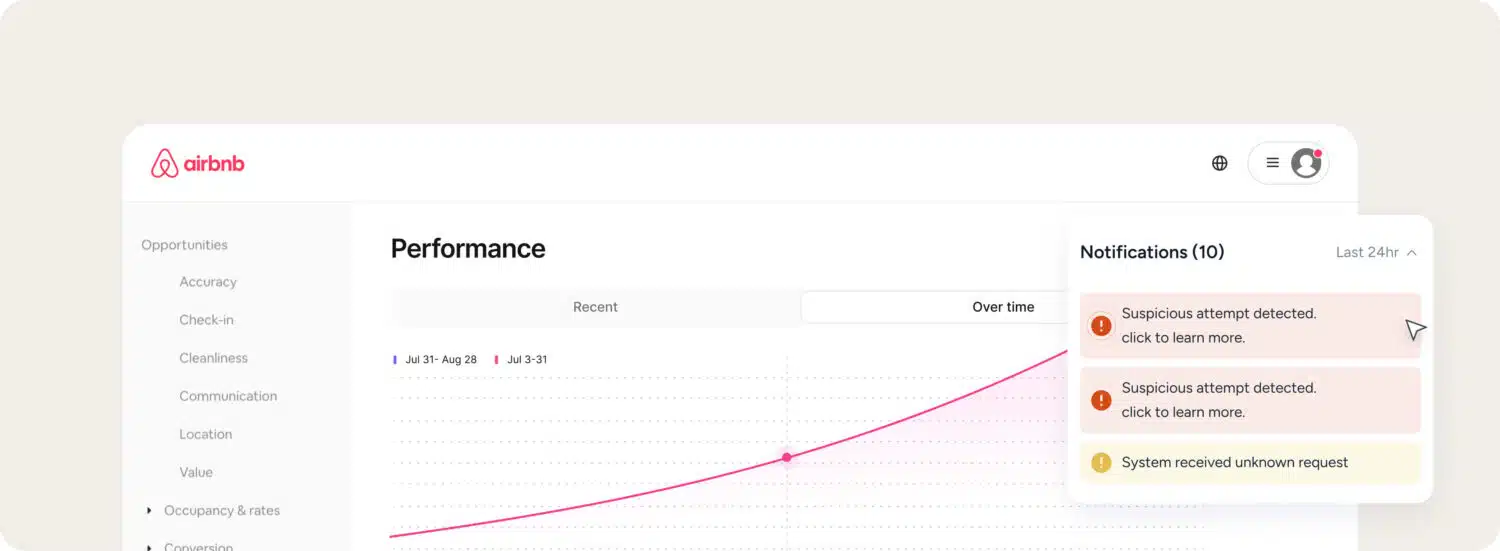As a vacation rental owner or short-term rental manager, you’ve likely heard horror stories about Airbnb scams and fraud. Unfortunately, with the growing popularity of platforms like Airbnb, scammers have found new ways to exploit unsuspecting hosts and guests. In this blog post, we’ll dive deep into the world of Airbnb fraud, explore common scams, and provide you with essential tips to protect your business and guests from falling victim to these schemes.

Understanding Airbnb fraud
Airbnb fraud refers to various deceptive practices that target both hosts and guests on the platform. These scams can range from identity theft to fake listings and can have serious consequences for all parties involved. As a property owner or manager, staying informed about these risks is crucial to protect your business and ensure a safe experience for your guests.
Common Airbnb scams to watch out for
1. Identity theft
One of the most serious forms of Airbnb fraud is identity theft. Scammers may attempt to steal personal information from hosts or guests to create fake accounts or carry out other fraudulent activities. Be aware of the following tactics:
- Phishing emails: Scammers send emails that appear to be from Airbnb, asking you to verify your account or update your information.
- Fake Airbnb websites: Criminals create convincing replicas of the Airbnb website to trick users into entering their login credentials.
- Social engineering: Scammers may contact you directly, posing as Airbnb support, and request sensitive information.
2. Fake listings
Some scammers create fake listings using stolen photos and information from legitimate properties. They may:
- List non-existent properties to collect payments from unsuspecting guests
- Use bait-and-switch tactics, showing one property but providing a different (often lower quality) accommodation upon arrival
- Create multiple listings for the same property to increase bookings
3. Account takeovers
In this scam, criminals gain access to a host’s Airbnb account and use it to:
- Change payout information to redirect funds
- Communicate with guests and alter booking details
- Damage the host’s reputation by providing poor service or canceling reservations

4. Overpayment scams
Scammers may overpay for a booking and then request a refund for the excess amount. They often use stolen credit cards, leaving the host liable when the fraudulent charge is discovered.
5. External booking requests
Some scammers try to lure hosts or guests off the Airbnb platform to complete bookings, often offering discounted rates. This leaves both parties vulnerable, as they lose Airbnb’s protection and support.
Red flags to watch for
To stay safe and avoid Airbnb scams, be on the lookout for these warning signs:
- Suspicious messages: Be wary of guests or “Airbnb support” asking for personal information or requesting to communicate outside the platform.
- Unusual payment requests: Legitimate transactions should always occur through Airbnb’s secure system.
- Too-good-to-be-true offers: If a deal seems unrealistic, it probably is.
- Pressure to act quickly: Scammers often create a sense of urgency to prevent victims from thinking critically.
- Poor communication: Be cautious of users with limited profile information or those who provide vague responses to your questions.
Protecting your business and guests
As a vacation rental owner or manager, you play a crucial role in maintaining the integrity of the short-term rental industry. Here are some steps you can take to protect your business and guests from Airbnb fraud:
1. Educate yourself and your team
Stay informed about the latest Airbnb scams and fraud tactics. Check Airbnb’s safety resources and industry news regularly to stay up to date with emerging threats.
2. Verify guest identities
- Carefully review guest profiles and read previous reviews
- Use Airbnb’s built-in verification features
- Consider implementing additional identity verification measures, such as video calls or requiring a government-issued ID

3. Secure your Airbnb account
- Use strong, unique passwords for your Airbnb account
- Enable two-factor authentication
- Regularly monitor your account for any suspicious activity
4. Communicate through Airbnb
Always use Airbnb’s messaging system for all communications with guests. This system records your interactions and helps protect both parties.
5. Use secure payment methods
Payments are only accepted through Airbnb’s official payment system. Never agree to cash payments or transfers outside the platform.
6. Implement strong booking policies
- Clearly outline your cancellation policy, house rules, and any additional fees
- Consider requiring a security deposit for high-risk bookings
- Use Airbnb’s “Instant Book” feature cautiously, and set specific requirements for guests who can use this option
7. Maintain accurate listings
Ensure your property listings are up-to-date and accurately represent your accommodations. This helps prevent misunderstandings and potential disputes with guests.
8. Invest in Property Management Software
Use property management software like Guesty Ultimate to streamline operations and enhance security. These tools can help you:
- Manage multiple listings across various platforms
- Automate guest communications and verifications
- Monitor booking patterns and flag suspicious activity
- Implement dynamic pricing to reduce the risk of overpayment scams
9. Educate your guests
Help your guests stay safe by providing them with information about common Airbnb scams and best practices for secure bookings. You can include this information in your pre-booking communications or welcome guide.
10. Report suspicious activity
If you encounter any suspicious behavior or potential scams, report them to Airbnb immediately. This helps protect the community and prevents other hosts and guests from falling victim to fraud.
Airbnb’s efforts to combat fraud
Airbnb is continuously working to improve its security measures and protect users from fraud. Some of their efforts include:
- Advanced fraud detection systems that analyze booking patterns and user behavior
- Secure messaging and payment systems
- User verification processes
- 24/7 customer support
- Airbnb guarantees for hosts and guests
While these measures provide a strong foundation for security, hosts and guests must remain vigilant and take additional precautions to protect themselves.
The impact of Airbnb fraud on the Short-Term Rental Industry
Airbnb scams and fraud can have far-reaching consequences for the short-term rental industry:
- Damaged reputation: High-profile scams can erode trust in platforms like Airbnb and the short-term rental market as a whole.
- Financial losses: Hosts and guests may suffer significant financial losses due to fraudulent activities.
- Increased regulation: As fraud becomes more prevalent, local governments may impose stricter regulations on short-term rentals.
- Higher operating costs: Implementing additional security measures can increase costs for hosts and platforms.
By staying informed and taking proactive steps to prevent fraud, you can help maintain the integrity of the industry and ensure a positive experience for your guests.
As an Airbnb host or short-term rental manager, staying vigilant against fraud is crucial for protecting your business and guests. By understanding common Airbnb scams, recognizing red flags, and implementing strong security measures, you can significantly reduce the risk of falling victim to fraudulent activities.
Remember, the key to avoiding Airbnb fraud lies in education, communication, and using the platform’s built-in security features. By following the tips outlined in this blog post and staying up-to-date with the latest security best practices, you can create a safe and enjoyable experience for your guests while protecting your vacation rental business.
Don’t let the fear of scams deter you from the many benefits of short-term rentals. With the right precautions and a proactive approach to security, you can confidently navigate the world of Airbnb hosting and build a thriving vacation rental business.
Stay safe, stay informed, and happy hosting!





